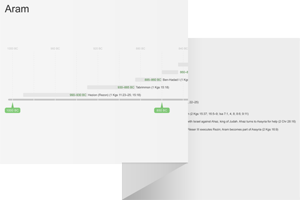9:1–7 The poetry of Isa 9:1–7 blends elements of thanksgiving and royal psalms to emphasize the ideals of Davidic kingship. Isaiah 11:1–9 similarly emphasizes a future idealistic rule of a Davidic king. Later Christian interpretation has understood both ch. 9 and Isa 11 as messianic prophecies awaiting perfect fulfillment in Christ’s second coming; no historical Davidic king fits the picture of the ideal ruler described here. |
9:1 the land of Zebulun and Naphtali As the two northernmost tribes in Israel, they would have been the first to fall in an invasion from Mesopotamia.
Galilee of the nations The present time is marked with judgment, but the future restoration will see Galilee as the gateway to the nations coming in peace to worship God. See 2:2.
9:2 a great light A symbol of hope in the midst of spiritual darkness.
9:4 the day of Midian See Judg 7:19–25.
9:6 a son has been given to us The promise of hope through a future Davidic king. Attempts to connect this promise to a ruler of Isaiah’s day usually focus on Hezekiah, son and successor of Ahaz, the king to whom Isaiah delivered his warnings and who rejected his offer to provide a sign in Isa 7:12.
Wonderful Counselor, Mighty God This list of titles or attributes for the future king include divine titles that would be unusual if referring to a human Davidic king. For example, “Mighty God” clearly refers to Yahweh Himself in 10:21.
9:8–10:4 This oracle of judgment against the northern kingdom of Israel is punctuated by the repetition of the phrase about God’s anger in vv. 12, 17, 21; and 10:4. Israel’s main sin was their trust in their own power instead of seeking and trusting God. |
9:9 in pride and arrogance of heart Israel’s pride in their own success and confidence that they will recover under their own power will be their downfall. Under threat of oppression and destruction, they exude naïve confidence in themselves instead of humble faith in God.
9:10 we will build with dressed stone While bricks were good, dressed stones were better. The Israelites do not fear losing what they have because they believe they will be able to replace it with something better and grander. The comparison of sycamores and cedars is a similar movement from something good to something even better.
9:11 the adversaries of Rezin Assyria, the power to whom Ahaz appealed for help against the alliance of Aram (also called Syria) and Israel. Rezin was king of Aram, north of Israel, and so first to experience Assyria’s invasion.
9:12 the east and Philistines from the west Though Israel is surrounded by enemies, she is confident in her own power without Yahweh.
He has not turned away his anger This refrain, which first occurs in 5:25, supports the increasing intensity of judgment against Israel, which will reach all levels of society.
9:13 and they did not seek Yahweh of hosts Judgment was inevitable once Israel chose not to ask for Yahweh’s deliverance. Israel’s history is marked by a pattern of disobedience, foreign oppression, and deliverance once they repented and cried out to God. See Judg 3:15.
9:14 in one day God will judge Assyria in one day, just as He uses Assyria to punish Israel in one day. See Isa 10:17.
9:16 misleading The leaders bear the blame for leading the people away from God.
9:17 orphans and widows Orphans and widows are usually afforded special care and protection in biblical law. However, the judgment is so thorough that all levels of society are affected. Even the lowest levels of Israelite society have turned away from Yahweh.
9:18 in a column of smoke Yahweh’s judgment comes by fire, and is symbolized by a column of smoke. Revelation 14:11 uses similar imagery to describe punishment in the lake of fire. God’s presence was revealed to Israel in pillars of cloud and smoke in Exod 13:21–24. Isaiah also envisioned Zion covered by God’s protective presence as a cloud and smoke in Isa 4:5–6. The column of smoke symbolizes God’s presence, either for protection or judgment.
 Fire as a Motif of Divine Presence
Fire as a Motif of Divine Presence
 Theophany in the Old Testament
Theophany in the Old Testament
9:20 devoured the flesh of his arm The horrors of a drawn-out siege are used metaphorically to depict the people turning on each other.
9:21 Manasseh devoured Ephraim The tribes of Manasseh and Ephraim were named after the two sons of Joseph. The metaphor suggests a lack of unity among the northern tribes, even as God used them to punish Judah. See 2 Chr 28:5–15.

|
About Faithlife Study BibleFaithlife Study Bible (FSB) is your guide to the ancient world of the Old and New Testaments, with study notes and articles that draw from a wide range of academic research. FSB helps you learn how to think about interpretation methods and issues so that you can gain a deeper understanding of the text. |
| Copyright |
Copyright 2012 Logos Bible Software. |
| Support Info | fsb |
 Loading…
Loading…


